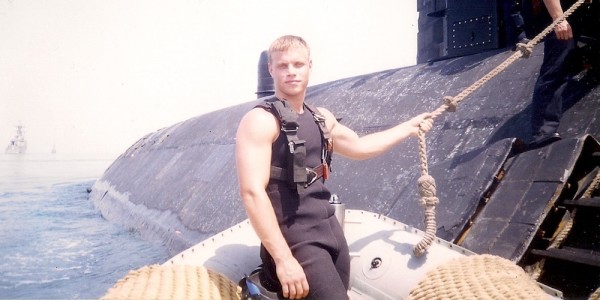

“My father gave us two things we were never allowed to do,” Brent Crouch says. “The first was ride a motorcycle and the second was join the Army. So I dropped out of college and enlisted in the navy so I could see the world and serve my country.” This very first transition set him up for several smooth career transitions later on.
After four years in the Navy, serving as an operations specialist and a search and rescue swimmer, Crouch went to college at the University of Massachusetts while working full-time. He graduated with a degree in political science – debt free – and started working at a local retail bank.
Find your passion
The paradoxes are strong in Crouch’s history. Operations specialist and search and rescue swimmer. Political science degree to Financial Advisor. But he’s been able to pull from each of his experiences and create a very successful career path. “One of the biggest things veterans struggle with is the transition he said. “Veterans are constantly thinking ‘Why would someone want to hire me?’ And learning how to explain your experience in a way that civilian employers can understand is the answer.”

Brent CrouchCourtesy of Brent Crouch
Crouch does this in a unique way right off the bat using LinkedIn. “What does a Financial Advisor have in common with a Search and Rescue Swimmer, a Retail Banker and a Business Development Manager? In my case, the thread that connects my career with my previous jobs is a passion for helping people and teams succeed,” it reads. Right away, you’re intrigued and want to learn more – which is the point.
“When you can articulate your story, it gives you a sense of confidence that helps with interviewing,” Crouch said. Learning how to tell your story and how to apply your experience to the job you want, is most of the battle of transition.
Longevity and loyalty
When working in a local bank became limiting, Crouch started looking at options, “I jumped at the opportunity to work as a Financial Advisor,” he said. “And Morgan Stanley gave me the opportunity to work as one. When it comes to financial and wealth management – it’s all we do, and in my opinion no one does it better.”
Crouch has worked for Morgan Stanley for over ten years and has no desire to go anywhere else. “If that’s what you want to do, you want to be at the place like Morgan Stanley,” he said. His loyalty to Morgan Stanley is matched by their commitment to veterans.
“It’s been really nice to see how they think of veterans during the transition and hiring process,” Crouch said. As the Veterans Outreach Coordinator for New England, Crouch spends time with transitioning veterans. He explains Morgan Stanley’s commitment, “We connect them to a hiring manager instead of having them go through an online portal. And then when they are hired, we give them a mentor within the company to help get them settled.”
Along with the hiring process, Morgan Stanley understands that some of their veterans may be activated with the Reserve or National Guard and they have a process in place to help them through that transition as well. “It’s been great to see Morgan Stanley create a space where veterans are comfortable deploying and then coming back to work,” Crouch said.
Tell them what they want to know
In his experience as a veteran transitioning, and from working with other veterans, he has a few pieces of advice. The main one is to just get started. “Gather as much information as possible, build a network, and start talking to people,” Crouch said. He says that most people are willing to meet for a cup of coffee and discuss what they do, and how they can help in the transition.
As far as interviewing, Crouch advises veterans to choose a few stories from your military service that service that illustrate the skills you’ve developed and the experiences you’ve gained.Then practice telling these stories in a compelling way that will resonate with hiring managers.

Brent CrouchCourtesy of Brent Crouch
And don’t laugh or roll your eyes at a hiring manager, most of them are trying to understand but may not fully grasp your experiences. Crouch shares a story about when he was getting hired, and the hiring manager asked how he’d handle working long, hard hours such as working 12-hour days, six days a week. Crouch explained it this way. “I said, ‘I spent 30 days at sea often at general quarters in the Persian Gulf – sleeping at work – nights out searching for lost pilots during storms – I understand what it means to work hard, and this will be fine.’ And the hiring manager was like, ‘Oh, of course.’”
Just having military experience is important, Crouch equates it to having a college degree. “It’s not what you learn day to day; it’s that you accomplished it. The biggest benefit is having the experience; it colors everything else that I do, it helps set the stage,” he said.
Sometimes the military is meant as a building block and not a 20-year career. Sometimes one step leads to another and doors never considered before are opened. All of these things are possible with a positive attitude, a solid understanding of what you have to offer, and a good work ethic.
For informational purposes only.The opinions expressed by the author are solely his/her own and do not necessarily reflect those of Morgan Stanley. ©2018 Morgan Stanley Smith Barney LLC.Member SIPC.